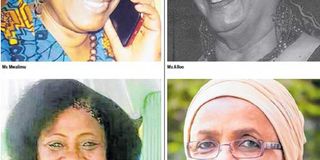Messages by key women achievers

What you need to know:
The history of women making positive change in society goes back many decades. Some of those behind the achievements share their views
Dar es Salaam. As world marks the International Women’s Day today, the focus has turned on women’s achievements in social, economic and political spheres.
The Citizen spoke with some of the women who have excelled in the media industry and who have shared their views over what remains to be done and what has been done so far and the challenges women currently face in the country.
Fatma Alloo
Fatma Alloo is a veteran journalist. She is one of the founders of the Uganda Media Women Association (Umwa). She also took part in establishing the Zanzibar International Film Festival (ZIFF) with a conviction that Africa should tell its own stories.
“At this point in time in Tanzania, we are generally aware of our rights, be it in rural or urban areas. But it stops there. My message to media practitioners of today is continue to use media as a mobilising force to effect change.
“The psychology of change for a just society has yet to be inculcated into our culture if Africa is to rise. The onus is on us-be it women or men,” she insisted.
Rose Haji Mwalimu
Rose Haji Mwalimu is a dynamic and dedicated Tanzanian female journalist, highly respected and renowned broadcaster with a Lifetime Achievement Award in Journalism in Tanzania 2017.
Her wide knowledge and leadership experience add value to the working relationship with diverse cultural identities and positions.
She has been a media practitioner for a little over 30 years (1983 – 2018) starting with Radio Tanzania Dar es Salaam (now TBC) after attaining her Master’s degree in Philosophy specialised in Journalism in the former Soviet Union (Russia 1982).
Her message on March 8 states that: “There has been picking momentum every year with different themes acknowledged and celebrated. We have seen changes occur in the political, economic and education arena but still social justice is at stake.
“Good policies do exist and awareness raising over the increasing gender gap in being acknowledged.
“We see many women in different leadership levels starting with the highest, the Vice President, more women executives, ministers, and media women in leadership positions.
“But most positions are still second class like deputy minister, district commissioner, deputy managing editor as opposed to their male counterparts,” she noted.
She added that SWOT analysis can help to shed more light for us and see why things aren’t working or working slowly, the causes of the escalated level of child abuse, gender violence, rape, sodomy and the consequences.
“What opportunities that we have, are there any threats that will hinder us from pursuing further? What strategies to counter those threats for positive change? This process will make us know where we were/ are/ going to and how to reach there,” she observed.
Halima Sharif
Halima Sharif spent many years in print journalism at the Daily News from the early 1980s to the mid-1990s.
She then moved to Germany and worked as a broadcast journalist for the Deutsche Welle where she continued with advocating for gender equality through a weekly women feature program before returning home in 2001.
She is a graduate of Carleton University in Ottawa, Canada, where she obtained her master’s degree in journalism, Ms Shariff’s has lived in North America, Europe and Africa and is fluent in English, Kiswahili, and conversant in French and German. She is married with one daughter and two grandsons.
Her message on this special day is not to dare make a mistake but rather to continue evaluating ourselves and see the areas which needing priority.
“For my part, we need to educate a girl child so she can escape engaging in sex at an early age. We need to put a system where we can protect a girl from the family level, national level and in society,” she said. She added that currently, statistics have it that about 27 girls in 100 aged 15-19 fall pregnant.
She emphasized that we need to eliminate the customs which devalue a girl child.
“Although it’s a challenge in the current world, but women as educators can do that if they have a will. Aluta Continua,” she said.
Mahfoudha Alley Hamid
She is a researcher, human rights activist specializing in women and children’s rights.
She works in coordination with other national and international NGOs in the UK, Germany, Denmark, Tunisia, Egypt, South Africa, and presented a paper on Structural Adjustment Programmes and how detrimental they are to third world countries at The Beijing ‘95 NGO Forum.
Her message on IWD is: “When we are celebrating this day, let us remind each other that we need to work on the current generation. We are so current in such a way we forget how we have been raised. We need to teach our girls those cultural positive values instead of thinking that every culture is negative,” she said.
She said, she raised all her four children, boys and girls, equally. She said she teaches the boys cooking and other domestic chores like she teaches her girls.




